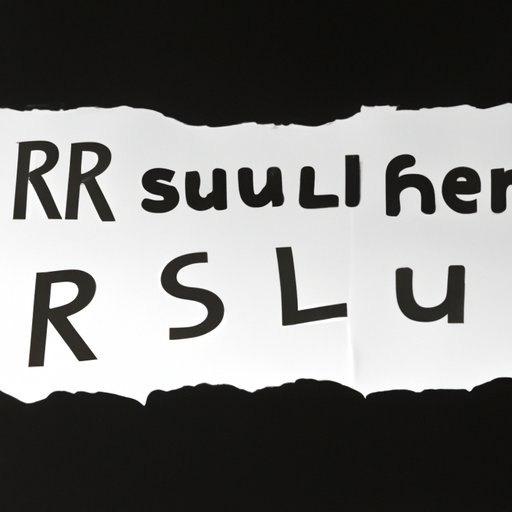Introduction
The ‘R’ word, also known as the r-slur, is a term used to refer to individuals with intellectual and developmental disabilities. Although it was once regarded as socially acceptable or even a medical term, it is now considered to be offensive and hurtful. In this article, we will explore what the r-slur is, its origins, and the impact it has on society. We will examine its historical context and discuss strategies for reducing the usage of this hurtful word. Additionally, we will suggest alternatives to using the r-slur and promote the usage of more inclusive language.
Defining the r-slur
The r-slur is a derogatory term used to describe individuals with intellectual and developmental disabilities. The term “retard” or “retarded” has historically been used as a medical diagnosis to describe individuals with developmental disabilities. However, over time, the term took on a pejorative meaning and usage became more common as a way to belittle or insult people. For decades, the term was also used to describe anyone considered to be socially or intellectually inferior, regardless of whether an individual actually had a developmental disability or not.
Today, the r-slur is considered to be an offensive and hurtful term. It is used to marginalize a group of people who are already vulnerable due to societal prejudices and discrimination. In fact, the term is so hurtful that many organizations and campaigns have been started to eradicate it from the public lexicon.
Exploring the Impact of the r-slur
The use of the r-slur can have a devastating impact on individuals with intellectual and developmental disabilities, as it perpetuates outdated stereotypes and reinforces negative prejudices. For many people, this term is not just a word; it is a weapon used to hurt and denigrate them. Using such language contributes to a culture of exclusion by reinforcing the idea that being different is inherently inferior. What’s more, the usage of the r-slur is likely to worsen the already difficult journey of individuals with intellectual and developmental disabilities towards an equal society.
The r-slur carries with it the assumption that people with intellectual and developmental disabilities are weak, incompetent, and dependent on others. Such perceptions are not just incorrect and unfair, but they pose a particular danger, as it can project onto them that they are inherently inferior to the rest of society.
Tracing the History of the r-slur
The word “retard” has long been used to describe a wide variety of cognitive disability, both in medical circles and ordinary society. It wasn’t until the late 20th century that the usage of the word became more debated and eventually recognized as a form of hate speech. In the 1980s and 1990s, disability advocates began requesting that the term be replaced with the phrase “intellectual disability”. In 2010, President Obama signed Rosa’s Law, which mandated that all government documents, including its healthcare coverage, use the term “intellectual disability.” Furthermore, it required the word ‘retarded’ be discarded from all government programs.
Examining the Cultural Significance of the r-slur
The r-slur has been widely used in popular culture, media, and even in everyday conversations as a way to insult someone based on their supposed lack of intelligence. However, language has a significant impact on how we perceive and treat individuals with intellectual and developmental disabilities. The media plays a huge role in shaping public attitudes towards individuals with a cognitive delay, reinforcing stereotypes and stigmas that can make it difficult to form genuine relationships or receive the support of different social institutions.
Moreover, the pervasive use of the r-slur in media can worsen the cognitive delay’s real-world prejudice. When terms like the r-slur are used casually or dismissed as not being harmful, it becomes very challenging to appraise their truly damaging impact. Popular usage of the r-slur contributes to the continued marginalization of individuals with developmental and intellectual differences, denying them the chance to be seen and met as complete members of society.
Exploring Alternatives to the r-slur
Fortunately, using more inclusive language is easy and can make a significant difference. Instead of using the r-slur, we can use phrases like “intellectual disability” or “developmental disability”. Alternatively, we can use phrases like “differently-abled” or “special needs.” These phrases acknowledge that everyone is different and that our differences should be embraced.
The usage of more inclusive language has many advantages other than just inclusivity; it also positively influences the vocabulary we carry into everyday life. Using more empathic and sensitive language every time leads to more constructive individual and societal beliefs, creating kinder relationships with people belonging to different groups.
Strategies for Reducing the Usage of the r-slur
Reducing the usage of the r-slur involves making individuals aware of the impact of their language on individuals with intellectual and developmental disabilities. To start, people can make a personal commitment to refrain from using the r-slur. Education on the rights of persons with disabilities should be prioritized in schools. Additionally, social media campaigns that bring awareness to the harm that such words cause can help in reducing the usage of the r-slur. Activities that encourage respect for cultural and individual differences can also be used, especially as a catalyst for change in social attitudes.
Conclusion
Our words have an impact, which makes it critical for all of us to choose our words carefully. The r-slur is not a mere word, but a term that reinforces societal prejudices and negative stereotypes regarding intellectual and developmental disabilities. It perpetuates a culture of marginalization that denies people equal opportunities. Moreover, using such hurtful language has a devastating impact on individuals with intellectual and developmental disabilities and their families. By using more inclusive language and promoting respect for differences, we can create a more equal and inclusive society.
